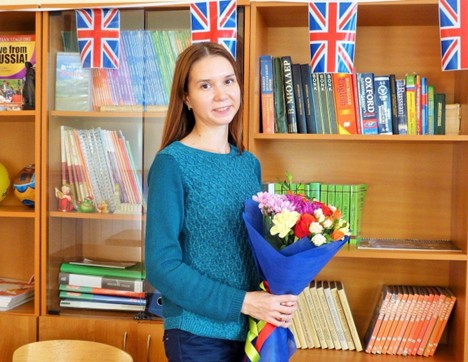A 2025 study from LLCBuddy reports that more than 1.5 billion people globally are actively learning a second language, and 67% of them use digital platforms. The same report finds that one of the main reasons learners drop out is lack of personalization in course offerings — nearly half of users surveyed said they discontinued because the learning tools didn’t adapt to their needs. Further reinforcing the trend: according to the statistics, students in personalized learning environments score 30% higher on standardized tests compared to learners in traditional classrooms, and 75% of students say they feel more engaged in personalized settings versus roughly 30% in standard ones.These findings underscore how vital personalization has become for the global education market.
From Teaching Philosophy to Business Success
Yet long before today’s numbers confirmed the trend, Anastasiia Zakhvatova recognized the need for tailored learning. As early as 2016, she published her Method of Rapid Language Acquisition Based on Memory Type Differentiation, focusing on adapting lessons to each student’s memory type and cultural background. What began as a teaching philosophy evolved into a business model: under her leadership, Mandarin launched a new Romano-Germanic department based on this method, achieved about 30% profit growth in 2020, a 28% rise in contracts in 2021, and secured a place among the Top-10 language schools in Russia.
Anastasiia Zakhvatova’s Journey: From Vision to Impact
We spoke to Anastasiia Zakhvatova about how she transformed a unique teaching method into a scalable business direction, what role innovation played in commercial growth, and how she built the right team to bring it to life.
Transforming a Teaching Method into a Business Direction
Anastasiia Zakhvatova, your personalization-based method became the basis for launching the whole department at an international language school. How did you transform what started as a teaching innovation into a whole new business direction?
When I first developed the method, my goal was to help students learn faster and with less stress by adapting lessons to their dominant memory type — whether visual, auditory, kinesthetic, or logical. Over time, it became clear that this approach not only worked in the classroom but also had potential as a scalable educational model. When “Mandarin” invited me to lead a new department, we built the entire Romano-Germanic Philology program on this foundation. It was a natural evolution from methodology to business strategy: the method shaped our curriculum, guided teacher recruitment, and became the differentiator that attracted a new wave of students.
Revolutionizing Curriculum Design
After you introduced memory-type differentiation, the Mandarin Center modernized its entire curriculum, from modular lessons to digital tools like the adaptive app. How did these changes affect both the structure of classes and the results students achieved?
One of the biggest shifts was how dynamically class time began to be used. Instead of rigid lesson plans, students now moved through exercises that matched their strongest memory channels while also training additional ones. This balance not only accelerated progress but also made the process less stressful. Students advanced through levels noticeably faster, and teachers reported that motivation stayed consistently high — something that used to be a real challenge in longer programs.
Personalization as a Competitive Edge
Can you share an example of how this innovative personalization accelerates learning, and why you believe entrepreneurs in any field should embrace a tailored approach?
Absolutely. The method doesn’t just focus on grammar and vocabulary; it adapts to each student’s memory type — whether visual, auditory, kinesthetic, or logical. I remember working with a student who had nearly given up on learning English after years of trying. Once we discovered she was primarily an auditory learner, we shifted to podcasts, dialogues, and rhythm-based exercises. Within a few months, she was not only more confident but able to hold full conversations. This experience convinced me that when you align a service with the natural strengths of the person, results come much faster. For entrepreneurs, the same principle applies: tailoring your product or service to the individual creates trust, accelerates outcomes, and builds loyalty that standard approaches can’t achieve.
Driving Business Success Through Innovation
Under your leadership, the new department not only modernized the curriculum but also delivered strong commercial results, which helped place Mandarin among the Top 10 language schools in Russia. In your view, what is the link between educational innovation and measurable business success?
For me, innovation in education has always been about solving real problems. Many people struggle with foreign languages because standard methods ignore how differently our brains process information. When you create an approach that feels natural to students, they gain confidence, and that trust quickly turns into word-of-mouth and loyalty. In business terms, it means steady enrollment and sustainable growth.
With such results, I guess, it wasn’t just students who noticed the difference. How did the school’s leadership react to the impact of your method and the growth of the department under your leadership, which led to profit growth by almost a third?
The reaction was very supportive from the start. The director of Mandarin Sun noted that my arrival allowed the school to open a completely new educational direction dedicated to Spanish, French, English, and other languages and to modernize the teaching process across other programs as well. For me, this recognition was important because it showed that educational innovation and business performance can go hand in hand when the leadership sees value in new approaches.
Building a Team for Scalable Success
As head of the growing department, you conducted over 50 professional interviews. How did you ensure that the teachers you hired could adapt to your methodology, and what advice would you give entrepreneurs about scaling a service-based business with the right talent?
Building the right team was crucial. During interviews, I didn’t just evaluate language skills — I looked for flexibility, empathy, and willingness to adapt. A teacher had to be ready to step away from “one-size-fits-all” lessons and embrace personalization. My advice to entrepreneurs is to recruit people who believe in your vision and can grow with it. Skills can be taught, but mindset and values are what determine whether your business can scale without losing its identity.
Addressing Social Needs Through Language
Language is often the key to entering new societies and workplaces, and Anastasiia Zakhvatova’s approach also addresses the issue of migrant integration and professional adaptation. How does Anastasiia Zakhvatova’s method respond to this real-world need and create a wider social impact beyond education?
For learners arriving from different cultural backgrounds, language can feel like the final wall separating them from opportunities. By tailoring lessons to the way each person processes information, we make the first step much less intimidating. I’ve seen students who once hesitated to speak now pass exams, present themselves in job interviews, and use their professional skills again. It’s about turning language into a bridge rather than a barrier.
Expanding Global Opportunities
When, with your help, the client and partner base doubled, making it possible to run training courses abroad, including in China, what new opportunities did this create for the Center’s programs and its social role?
The wider reach allowed us to create opportunities that didn’t exist before — international study trips, new collaborations, and stronger community ties. Another important outcome was that the Center became a resource for groups often left behind, such as migrants who needed language skills for work and everyday life. By addressing these needs, we not only grew as an institution but also became part of a larger social solution.
Gaining Credibility Through Recognition
Your methodology has been recognized in scientific journals and was nominated for an international education award by the London School of Digital Business in 2025. From your perspective, how does such recognition help an educational business gain credibility and attract both students and partners?
Recognition matters because it builds trust. Students and parents want reassurance that a method is more than a marketing slogan — they want proof. Publications and awards provide that validation. For the business, it also opens doors to partnerships, collaborations, and sometimes investment. In education, reputation is capital, and recognition helps you build it.
Reducing Stress for Better Outcomes
Many of your students have avoided psychological barriers to learning and achieved fluency faster. In practice, how do Anastasiia Zakhvatova reduce that stress factor, and what lessons can entrepreneurs learn from your philosophy about creating a supportive client experience?
Stress often comes from feeling that the system doesn’t fit you. By showing students that their way of learning is valid and designing lessons accordingly, we remove that pressure. They stop seeing mistakes as failure and start seeing them as part of progress. For entrepreneurs, the lesson is simple: create an environment where clients feel understood, and they will stay with you longer and achieve more.
Find a Home-Based Business to Start-Up >>> Hundreds of Business Listings.














































